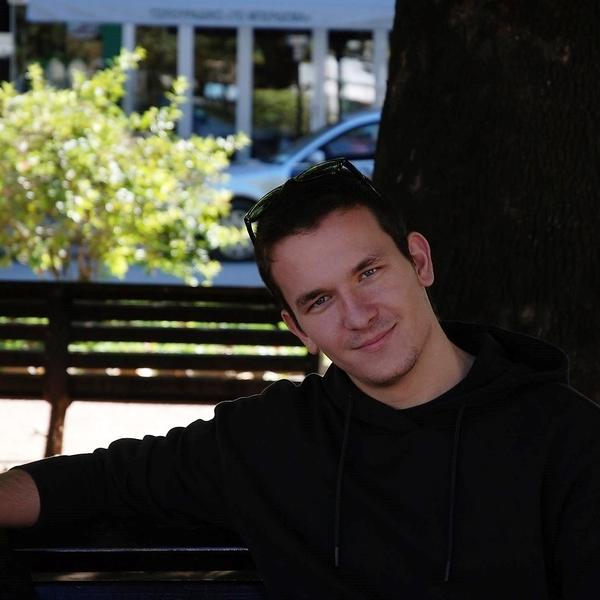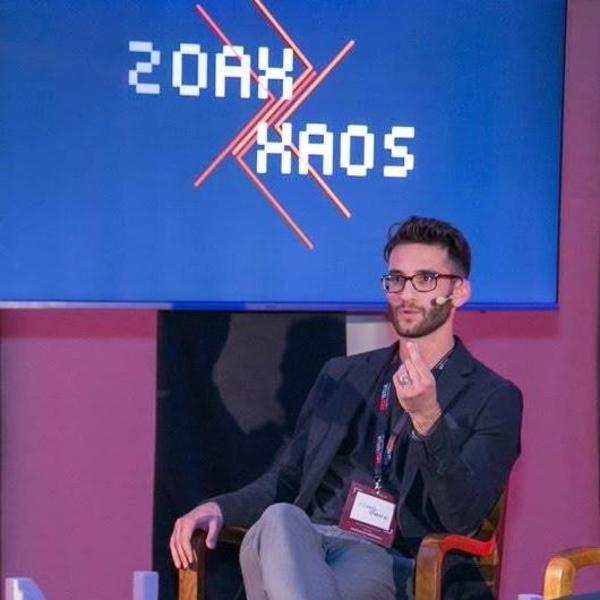Delft Hyperloop team, TU Delft (Delft, Netherlands). Represented by Rieneke van Noort and Lanke Yin.
Delft Hyperloop is a student team from TU Delft, located in the Netherlands. With 39 engineers, they are competing in the 2019 SpaceX Hyperloop Pod Competition, a competition for student teams around the world to come up with a concept vehicle that can travel as fast as possible in a vacuum tube that is one kilometer long. Why? The transportation industry is in need of a new, innovative form of transportation: the Hyperloop. Delft Hyperloop is represented at TEDxNTUA 2019 by Rieneke van Noort, the Team Captain, and Lanke Yin, Design Engineer.
Dr. Electrical and Computer Engineer, NTUA- Stanford. CNRS researcher, Sorbonne University (Paris, France). Vice director of the Paris Centre for Quantum Computing.
Eleni Diamanti is a CNRS researcher at Sorbonne University in Paris, France. She received her Diploma in Electrical and Computer Engineering from the National Technical University of Athens, Greece, in 2000 and her PhD in Electrical Engineering from Stanford University, USA, in 2006. She then worked as a Marie Curie post-doctoral scholar at the Institute of Optics Graduate School in Palaiseau, France, before joining the CNRS in 2009. Her research focuses on experimental quantum cryptography and communication complexity, and on the development of photonic resources for quantum networks. She is a recipient of a European Research Council Starting Grant, vice director of the Paris Centre for Quantum Computing, steering committee member of the French regional and national networks on Quantum Technologies, and elected member of the Board of Stakeholders of the European Public Private Partnership in Photonics.
Architects-Eng. Founders of the architectural office En-Route architects (E-R-A), based in Athens.
En Route is an international architecture practice based in Athens. They believe in design through analysis and research. Design is a process, specifically created for each project. The team was founded by Hannes Livers Gutberlet and Katerina Kourkoula, who both practiced architecture in London, New York, Zurich and Rotterdam. Hannes studied economics at the EBS University (MBA) in Germany and architecture at TU Delft (Bachelors), at M.I.T. and at ETH Zurich (MArch). He has worked as a researcher and he has taught architecture at ETH Zurich. He has worked at Architectuurstudio Herman Hertzberger, at the Office for Metropolitan Architecture (OMA) and at Urban Think Tank. He is a PhD candidate at ETH Zurich. Katerina studied architecture at the Bartlett school of architecture (BSc) at UCL and at the Cooper Union (BΑrch & MΑrch II), where she received the ‘AIA School Meda’ and ‘The Certificate of Merit’.
Researcher. Astrophysicist, European Southern Observatory (ESO). Coordinator of the European network for the astronomical facility ALMA.
Dr. Evanthia Hatziminaoglou is an astrophysicist at the European Southern Observatory (ESO) near Munich, Germany. At the age of six she decided she would explore the Universe and she has been following her dream ever since. She studied Physics at the Aristotle University of Thessaloniki and holds a master’s degree and a PhD in Astrophysics from the University Paul Sabatier in Toulouse, France. Since 2011 she is the coordinator of the European network that provides scientific support to all users from ESO member states that want to make use of the world’s largest ground based astronomical facility, the Atacama Large Millimetre Array (ALMA). Her research focuses on active galaxies, galaxies that harbour supermassive black holes in their centres, accreting material and releasing tremendous amounts of energy, directly affecting the growth of the galaxies themselves.
Associate Professor, Masaryk University (Brno, Czech Republic). Director of the Human-Computer Interaction Laboratory.
Fotis Liarokapis is an Associate Professor and the director of the Human-Computer Interaction Laboratory at Masaryk University, Faculty of Informatics at Brno, Czech Republic. Before, he was the Director of Interactive Worlds Applied Research Group (iWARG), Faculty of Engineering and Computing at Coventry University and a research fellow at the Serious Games Institute (SGI). He has contributed significant publications in the broad areas of virtual and augmented reality, serious games and brain-computer interfaces. He has organised multiple conferences and workshops and he is the co-founder of VS-Games international conference.
Researcher. Leader of the Robotic Lab at Tamas Vicsek’s Research Group, Department of Biological Physics, Eötvös University (Budapest, Hungary).
Gábor Vásárhelyi is a researcher in the field of collective motion and collective behavior of animals and robots (drones). He received his MSc in engineering-physics from the Technical University of Budapest in 2003, and his PhD in technical sciences (info-bionics) from Péter Pázmány Catholic University, Hungary, in 2007. Since 2009 he is with Eötvös University, Department of Biological Physics as leader of the Robotic Lab at Tamas Vicsek’s Research Group on collective motion. He is currently a senior research fellow at MTA-ELTE Statistical and Biological Physics Research Group and CEO of CollMot Robotics Ltd., a spin-off dedicated to multi-drone services. Awards: Junior Prima Award, category of informatics (2007), Magyary Postdoctoral Grant (2013), Bolyai János Research Scholarship (2015).
Professor, University of Athens. Attorney at law - Legal Theory, Public and Constitutional Law.
Ioannis A. Tassopoulos is Professor of Public Law at the University of Athens (Department of Political Science and Public Administration) and attorney at law. He is a graduate of the University of Athens (LL.B) and of the Duke Law School (LL.M, SJD). His academic interest is in constitutional law, theory and history; jurisprudence; and political philosophy. His publications include five monographs, among them: “Popular Sovereignty and the Challenge of Impartiality,” (Athens 2014, Kritiki, p. 656, in Greek); his doctoral dissertation “The Constitutional Problem of Subversive Advocacy in the United States of America and Greece,” (Athens-Komotini 1993, Ant. Sakkoulas Publishers, Publications of the Hellenic Institute of International and Foreign Law, p. 288); and more than 50 articles in Greek, English and French.
Researcher in Max Planck Institute for Mathematics in the Sciences, Leipzig Co-founder of Creaited Labs
Dr. Ivan P. Yamshchikov is a researcher for artificial intelligence and cognition in Max Planck Institute for Mathematics in the Sciences in Leipzig. He popularizes artificial intelligence and its versatile industrial applications. He is also a co-founder of Creaited Labs (creaited.com), a project aimed to develop the creative potential of artificial intelligence. In Creaited Labs, together with his co-author, Alexey Tikhonov, he has created Neurona, a music album that contains AI-generated Kurt Cobain-stylized poetry.
Oslo-based architectural studio founded in 2015 by Amandine Kastler and Erlend Skjeseth
Kastler Skjeseth Architects is an Oslo-based architectural studio founded in 2015 by Amandine Kastler and Erlend Skjeseth. The studio has extensive experience working with existing buildings and heritage environments in Norway and the UK. Prior to setting up the studio, Amandine and Erlend worked for David Chipperfield Architects London, Jarmund Vigsnæs Oslo, and OMA AMO Rotterdam. As a studio, they engage with alternative forms of preservation, utilizing existing natural, historical and social qualities of a place to shape their design practice.Through built projects and academic work, Kastler Skjeseth Architects seeks to discover vocabularies whether verbal, formal, material or otherwise, that articulate and transform these existing structures. Amandine and Erlend are currently teaching at the Oslo School of Architecture and Design (AHO) in Oslo and the Architectural Association (AA) in London.
Dr Architect-Eng. Emeritus Professor NTUA. President of the Acropolis Restoration Committee. Member of the Central Archaelogical Council of Greece
Manolis Korres was born in Athens,in 1948. He is an Dr. Architect-Engineer, Dr. Ph. h.c. FU Berlin, an Emeritus Professor of NTUΑ, Member of the Academy of Athens, President of the Acropolis Restoration Committee and Μember of the Central Archaeological Council of Greece. His professional scientific work and research include, between others, the Acropolis Restoration Project, monuments in Amorgos, Naxos, the Metropolis in Thessaly, Amyclae near Sparta and the Pythion castle. Manolis Korres is an author of 12 books and 120 articles and has exhibited architectural models and drawings in 14 different occasions. He has received various prizes, distinctions and scholarships including Gr. Ministry of Education, DAAD, DAI, Princeton University and Fulbright (1995). Medals: Bronze, Academy of Athens (1989), Silver, Académie d' Architecture, Paris (1995), Gold, National Academy in Rome (2013). Taxiarches of Phoenix of the Greek State, Premium Alexander von Humboldt (2003).
PhD Candidate (ETH Zürich) - Nanotechnology and Materials Science.
Marianna Diamantopoulou is a PhD candidate at Swiss Federal Institute of Technology (ETH) in Zurich, Switzerland. She graduated from the Department of Chemical Engineering in Patras in 2014, and pursued further a M.Sc. degree at ETH. Her master thesis project was funded by General Electric and conducted in Binnig and Rohrer Nanotechnology Center (BRNC), a shared facility between IBM and ETH. Before starting her journey in the research world, she also gained professional experience by working as a Chemical Engineer in Pöyry Switzerland AG.
Novelist, short story writer, playwright. Nuclear physicist.
Michael Spengos is a writer, who previously studied and worked as a Nuclear Physicist. He received his BS from the University of Thessaloniki in Greece, a Masters of Science from the American University in Washington DC, and a PhD at the Stanford Linear Accelerator Center, in California (Thesis topic: “The spin of the neutron”). He then completed an one year post-doc in the University of Pennsylvania, and consequently a three-year term in Hamburg/Germany as a fellow of the German Government. In 1998, he took a steep turn in his career and after seventeen years of studying and working as a physicist, he decided to follow his dream, to become a writer. He has written seven novels, three collections of short stories, and four theatrical plays.

